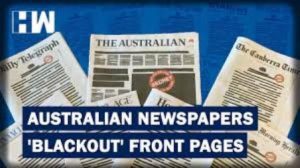Australian Media Goes Blank
Right To Know campaign has reached its peak when Australian Newspapers decided to go blank as a sign of protest.

Major media organizations in Australia blacked out the front pages of their newspapers including websites on Monday in solidarity for a legislative change to protect the press and to bring in more transparency in government functioning. Major news organizations including SBS, the ABC, Nine, News Corp Australia and The Guardian joined together in the protest. The television networks too registered their protest in the form of advertisement, questioning ‘When the government hides the truth from you, what are they covering up?’.
Federal police raids on the national broadcaster ABC and the home of a News Corp reporter earlier this year triggered the movement by the Right to Know alliance over two reports that had proven humiliating to the government. It focuses on six requests, including exceptions from strict national security laws for reporters who have created a complex web of protections that critics say too easily.
Also Read : Fatf Retains Pakistan On Its Grey List
The blackout coincides with a government investigation into the freedom of the press, which was heard on Friday by media bosses and journalists, who said that national security and intelligence law left reporters unable to do their jobs and whistle-blowers afraid to come forward. The raids at the homes of News Corp and ABC Sydney journalists were seen as a threat to press freedom.
Genesis
It all started after the 9/11 owing to protect the citizens from National security threats. Since then, overall 75 federal legislations were passed to curb the media freedom by categorizing it as ‘state secret’ or against the public interest.
Over the past 20 years, more than 60 pieces of legislation have been formed by the alliance of media organizations that restrict journalists’ freedoms to do their work and prosecute whistleblowing.

Journalists face potential criminal charges after the raids—Smethurst was considering attempts to spy on Australians for disclosing the government—and two ABC reporters for reporting suspected war crimes by Australian special forces in Afghanistan. Speaking about the whole incident, Prime Minister Scott Morrison said, ‘always believe in the freedom of the press’, but he also insisted that journalists were not above the law.
Escalation of Tension
Shortly after the May re-election of Australia’s Liberal-led conservative government, the issue came to a boil when police raided the Australian Broadcasting Corporation (ABC) headquarters in Sydney and a News Corp editor’s home on suspicion of receiving national secrets. The searches, involving police inspection of about 9,000 ABC computer files and sifting through the underwear drawer of the female News Corp publisher, attracted international condemnation.
Denis Muller from the University of Melbourne’s Centre for Advancing Journalism said, ‘Compared to New Zealand, the US, the UK and Canada, Australia’s intelligence and national security laws are the ‘most oppressive’. The ABC’s Managing Director David Anderson also warned that Australia was at the risk of becoming ‘the world’s most secretive democracy. No one is above the law but something in our democracy is not working as it should when we fail to protect people acting in the public interest’, he said.
Also Read : Will There Be War Forever In The Heart Of Asia
Way Forward
The campaign argues that tougher security laws have threatened investigative journalism over the past two decades, eroding the ‘right to know’ of the public.
Since the introduction of new counter-espionage laws last year, media outlets have campaigned for exceptions to publish sensitive information to reporters and whistle-blowers. This is part of a list of seven demands put to Monday’s government, which is also calling for changes to the laws of freedom of information and defamation. According to the world press, Freedom Index Australia stands at the 21st spot worldwide.
Know Your Rights Campaign
The campaign calls for six changes to existing Australian legislation, which, according to the country’s media, will go a long way in preserving the freedom of the press. A coalition of Australia’s leading media organizations and industry groups initiated the movement over a decade ago to ‘protect the right of the Australian public to know’ what the government they elected was doing. The six Australia’s Right to Know reforms being sought are as listed: The right to contest any kind of search warrant on journalists or news organizations before the warrant is issued; Law change to ensure public sector whistle-blowers are adequately protected; A new regime that limits which documents can be marked ‘secret’; Review of Freedom of Information; Laws that journalists be exempt from national security laws enacted over the past seven years that currently can put them in jail for doing their job, and Reform to defamation laws.
